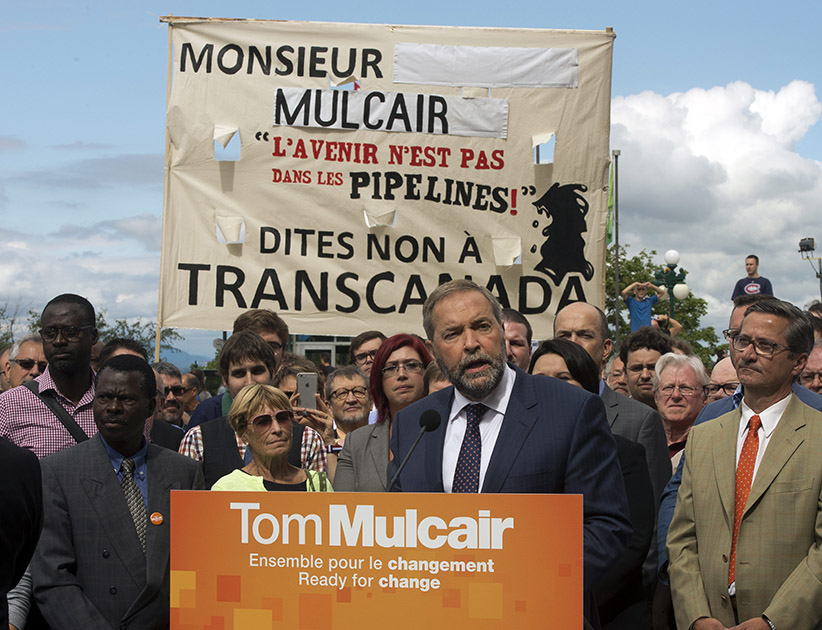Election 2015: Political leaders interacting with people
After the shoutiness during a Conservative election event, Tom Mulcair is heckled in Winnipeg. How should party leaders deal with the common man?
Liberal Leader Justin Trueau, right, greets NDP Leader Thomas Mulcair during a federal election campaign stop at the annual gay pride parade in Montreal, Sunday, August 16, 2015. THE CANADIAN PRESS/Graham Hughes
Share

On the subject of last week’s shoutiness at a Conservative announcement, Christopher Waddell charts the evolution of the political event from public gathering to staged performance. I referred to to his analysis last week and would concur with his take on the current situation.
Of the ways things used to be, Waddell writes: “Not that long ago, leaders actually spoke at advertised events that invited the public to attend. There was always the risk of hecklers and demonstrations, but good politicians took that in stride and frequently turned it to their advantage.”
On that note, here, courtesy of the Winnipeg Free Press, is video of NDP Leader Thomas Mulcair encountering hecklers during a speech last week:
And here is Mulcair dealing with protesters (on the same issue) at the launch of his book in Toronto two weeks ago:
It’s probably necessary to discuss the appropriateness of interrupting a speech and whether we might wish to generally discourage such behaviour.
On the same theme of politicians encountering public dissent, there was Liberal Leader Justin Trudeau (and two Liberal candidates) meeting with citizens who were protesting Bill C-51 outside a Liberal event in Edmonton in June:
And, from 2013, there was Trudeau encountering a woman who opposed his view on marijuana legalization:
I wouldn’t want to idealize these interactions. But such moments are rare breaks from the carefully designed presentations that dominate professional politics. And, to varying degrees, such occasions have a chance of adding something to the discussion. As far as spontaneity is concerned, we otherwise only have the daily question-and-answer sessions with reporters (during which the politician is under no obligation to treat the questioner as a human being) and the leaders debates (which are preceded by hours of preparation and strategizing, but still at least hold the possibility for drama). And if you were designing a decathlon for aspiring prime ministers, it would be worth making one of the events an encounter with a skeptical voter (the other nine events: make a speech, announce a policy, feign interest in the people participating in a photo opportunity, avoid providing a straightforward answer to a reporter’s question without seeming grossly evasive, speak in the House while being heckled without flinching, select a cabinet, accept the resignation of a staff member, impugn a rival’s fitness for office without seeming mean, and pose for a picture in front of a giant Canadian flag).
[widgets_on_pages id=”Election”]
The Liberals had suggested that “at least one debate during this election should be a town-hall-style format, where the bulk of the interactions are audience-based.” Of course, at this point, the Liberal leader might have had the least to lose from participating in such a forum, and the incumbent, with 9½ years of running the country to defend, would be most at risk. For whatever it’s worth: The second U.S. presidential debate in 2012 was a town hall, though, in that case, the defining challenge to a candidate came from the moderator. The three major British leaders also took questions from studio audiences assembled by the BBC and Sky News during this spring’s U.K. election.
It’s worth discussing the practicalities of such settings. Last week, I asked Jim Armour, a strategist who has advised conservatives in the past, whether he’d advise a leader to participate in a televised town hall with unscripted questions from the audience, and he provided a useful overview of some of the considerations. “When I started out in the mid- to late ’90s, unscripted questions from citizens in a town-hall format was the price of admission for any politician, especially for a grassroots guy like Preston Manning. But it wasn’t just limited to Reform; Chrétien did them, as did Bush and Clinton. It was the flavour du jour, so you didn’t really have the option not to do them. From a communications-staffer point of view, the best we could do was prep the leader to answer the tough questions and try to stack the room with friendlies,” Armour said. “As time went on, however, the so-called average Joes in the audience became fewer and fewer. Third-party groups (corporations, issue advocates, industry associations, unions, partisans, etc.) became more organized and strategic. They started to send their folks to these events and made sure they got to the microphones. Also, media outlets started to game things a little. In the name of being representative and balanced, they specifically invited people to attend based on their geography, perspective or issue. What’s more, it got to a point when the only coverage that came out of televised town halls was the gaffe, misstep or logistics snafu.”
Beyond the relative shallowness of the coverage of such an event, the challenge might be whether you could create a useful approximation of what would happen if a political leader encountered a representative sample of the public. (Mind you, a representative sample of the public might include a large number of people who were only vaguely aware of who the politician was, or what he’s responsible for.) That could probably be managed with some amount of conscious staging.
Granted, this might seem to contradict the goal of getting away from stage-managed events—replacing one kind of spectacle with another. But, on principle, a stage-managed event in which the political leader has to deal with the uncertainty and challenge of a voter with a question might still be preferable to a stage-managed event in which the political leader is only challenged by his ability to read from a teleprompter.